A Consumer Guide to the Trailing Edge: February, 2013
Recycled Goods (#105)
by Tom Hull
Piano remains the most popular instrument in jazz, well rounded enough that virtually all jazz pianists sooner or later try their hand at a solo album. Even more common are piano trios with bass and drums. In mainstream bop/postbop you occasionally find pianist who like to write for horns -- Thelonious Monk and Cedar Walton are especially notable -- and in avant you find a lot of piano duos -- mostly with a horn, sometimes with drums, occasionally something else, maybe even another piano. I have a pretty firmly established preference for saxophones, so the plethora of pianos can turn into a drag: I routinely plow through piles of piano albums that I respect, admire even, but soon tire of. I wonder if my reaction is becoming rote, and within the most common norms of jazz it probably is, but occasionally something special breaks through and I wind up with a handful of piano jazz albums on my year-end lists.
This month the deadline snuck up on me, and when it did I had nothing but two jazz pianists in the file. I've surveyed Matthew Shipp's career at length a couple times before: for Rolling Stone here, and for Static Multimedia here (in what started as a piece on Shipp but expanded to cover bassist William Parker). Shipp's Greatest Hits sums up his post-1990 career nicely, not because there are any actual hits there, but because his move to a rock label got him working in tight, catchy chunks.
Meanwhile, I tried to track down a recent album by Marilyn Crispell and found a treasure trove of unheard-by-me albums on Rhapsody. I had half of them snarfed up before deadline, and spent the first few days of February trying to run the table. I've been known to vote for her in polls -- as I have Shipp, and I might also mention Myra Melford -- but I had never gotten the full measure of her music, so this has been eye-opening for me. Time kept me from digging deeper into her quartet work with Anthony Braxton, so that will have to come later. (As I note below, there is still a lot of Braxton I have yet to hear, and I do mean a lot.) Also some Barry Guy -- an artist I've never gotten the hang of, although Phases of the Night (with Crispell and Paul Lytton) was one of those piano trios that instantly awed me.
My scratch sheet for Crispell is here. It's based largely on a sessionography by Rick Lopez, which also indicates the existence of several dozens of bootlegs, so I imagine we'll be hearing more archival material over time. As of now, I've heard 24 of 43 records (56%) where her name goes first, and 16 of 62 (26%) other records she's played on. (I've certainly heard higher percentages of Shipp, but don't have the numbers handy.) I do know that I haven't gotten to the bottom of Rhapsody with her: they have some of the missing Braxtons, at least one more Barry Guy, and an Ivo Perelman set cut the same day as En Adir. Possibly more. Will have to keep digging around.
Short on records this time, especially above the Briefly Noted, but check the ACN for two supplmentary lists from the database. With over 21,000 records rated, that at least is easy to do.
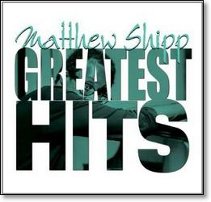 |
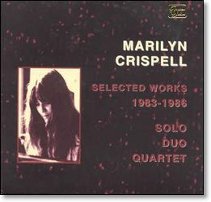 |
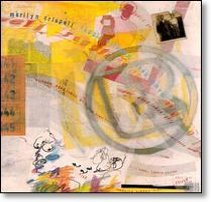 |
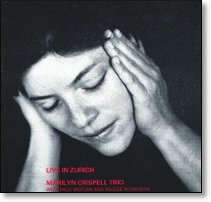 |
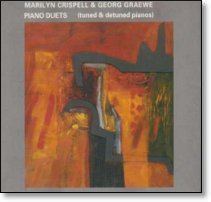 |
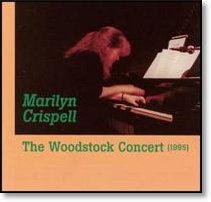 |
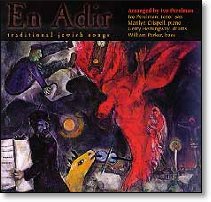 |
Matthew Shipp: Greatest Hits (2000-2012 [2013], Thirsty Ear): Before 2000 Shipp had established himself as one of the avant-garde's most rigorous pianists through a series of often startling duo and trio albums -- mostly duos. Most were on the usual obscure European labels, but a couple -- ranging from the tedious 2-Z with Roscoe Mitchell to the superb Zo with bassist William Parker -- came out on a postrock label in Connecticut. Thirsty Ear wound up hiring Shipp to curate "The Blue Series": think of them as postrock crossovers made by Shipp's avant chums plus a few secretly admiring DJs. Early on, the series tracked public interest in "jazztronica" -- but unlike the previous decade's "acid jazz" fad or the later dabblings of more-or-less mainstream figures ranging from Nicholas Payton to Dave Douglas -- Shipp's series never felt like a compromise. But later on, Shipp seemed to grow weary of the electronics and tried to reassert himself as an acoustic jazz pianist (especially on the solos One and 4D and the mixed solo-trio Art of the Improviser). Of course, nothing he did was a "hit" in the pop sense, but these dozen cuts from eleven albums both hit the high points and drive home the primacy of his piano. A-
Briefly Noted
Anthony Braxton/Marilyn Crispell: Duets: Vancouver 1989 (1989 [1990], Music & Arts): Half of Braxton's remarkable 1984-93 quartet, strip the rhythm off and he slips into his solo abstractions, which she not just props up but muscles around. B+(***) [R]
Marilyn Crispell: Selected Works: 1983-1986: Solo Duo Quartet (1983-86 [2001], Leo, 2CD): Part of the label's "Golden Years of New Jazz" series, starting off solo piano (6 cuts, 48:15), adding drummer Doug James (7 cuts, 43:31), and finishing with a 38:00 bass-cello-drums quartet improvisation; she is rarely less than riveting, James is growing on me, and the strings just make the piano that much more percussive. A- [R]
Marilyn Crispell/Reggie Workman/Doug James: Gaia (1987 [1988], Leo): Avant-piano trio, starts cautiously but when she picks up speed she is dazzling, breaking only to let the bassist work up some serious mojo (and to give James a crashing solo). A- [R]
Marilyn Crispell Trio: Live in Zürich (1989 [1990], Leo): Piano trio, with Reggie Workman and Paul Motian, two who know a lot about filling out and balancing off a piano trio, although for once the drummer doesn't make it look easy -- Crispell's crisp, deep, muscular, and prickly piano keeps him on his toes. A- [R]
Marilyn Crispell: Live in San Francisco (1987-89 [1990], Music & Arts): Eight solo pieces, including Monk, Coltrane, "When I Fall in Love" -- exacting, but not at his most exciting -- followed by two live-but-non-SF curiosities: a 10:10 duet with Anthony Braxton (mostly on flute), and a 5:30 group led by Reggie Workman with Jeanne Lee singing and Don Byron on clarinet. B+(**) [R]
Marilyn Crispell/Georg Graewe: Piano Duets (1991 [1992], Leo, 2CD): A piano pairing even more resourceful than the previous year's Overlapping Hands with Irène Schweizer, probably because Graewe dissimilarity offers a more complementary approach; the "tuned pianos" of the first disc give way to "detuned pianos" on the second without any calamity, as both pianists take what the machines give, turning surprise into delight. A- [R]
Marilyn Crispell: Highlights From the 1992 American Tour (1992 [1993], Music & Arts): Seven piano trio cuts with Reggie Workman and Gerry Hemingway, from four tour stops, the title unclear from the cover -- Rhapsody goes with a song list, starting with "Suite for Two"; the suite is less compelling than the rhythm grind, which picks up on the second half. B+(***) [R]
Marilyn Crispell: Stellar Pulsations/Three Composers (1992 [1993], Leo): Cover continues, "Music by Robert Cogan/Pozzi Escot/Manfred Niehaus," so those are the composers; Ellen Polansky is also credited with piano on the rigorous first piece; Crispell is joined by Don Byron and Gerry Hemingway for the chamberish second, and the entire WDR Radio Orchestra swims up the Third Stream on the finale, "Concerto for Marilyn" -- punctuated, of course, by some exceptional piano. B [R]
Marilyn Crispell/Tim Berne: Inference (1992 [1995], Music & Arts): Piano-alto sax duo; Crispell's piano is so dense, so harmonically rich, so percussive that she covers much of what a bass and/or drums would do, but the sax holds center stage, and at this point in his career Berne tended to irritate as well as intrigue. B+(*) [R]
Marilyn Crispell/Anders Jormin/Raymond Strid: Spring Tour (1994 [1995], Alice): Piano trio cut in Sweden, home turf for the others; all three contribute songs, with Jormin's genteel avant-ambiance already pointing him toward ECM; the pianist obliges by forgoing her pyrotechnics in favor of lighter, subtler abstractions. B+(**) [R]
Marilyn Crispell: Live at Mills College, 1995 (1995, Music & Arts): Live solo piano, four long cuts -- one by Monk, one a standards medley, two originals -- plus a short one called "Drums"; not much reason to prefer this over similar records, except when she gets rowdy, which happens often enough. B+(***) [R]
Marilyn Crispell: The Woodstock Concert (1995 [1996], Music & Arts): Another solo, less than three months after Live at Mills College, two months before the superb Contrasts: Live at Yoshi's (1995), even more of a tour de force -- "In Lingering Air" multiplies her percussion and harmonics into something wondrous, a level she returns to time and again, but by then even a relatively quiet stretch pulls you in. A [R]
Marilyn Crispell/Stefano Maltese: Red (1999 [2000], Black Saint): Sicilian saxophonist, plays soprano, alto, and tenor here, plus bass clarinet, has more than a dozen albums but little you'll find outside Italy; the first of two duos with the pianist, good-natured exploration without a lot of clash. B+(*) [R]
Barry Guy/Mats Gustafsson/Raymond Strid Trio with Marilyn Crispell: Gryffgryffgryffs (1996 [1997], Music & Arts): Bassist Guy is a recurrent figure in Crispell's discography; drummer Strid is a guy you look up when playing in Sweden, where this was originally a radio program; the Norwegian saxophonist is in subdued form, playing a little cat-and-mouse game with the pianist, impishly favoring the mouse. B+(**) [R]
Joseph Jarman/Marilyn Crispell: Connecting Spirits (1996, Music & Arts): Jarman was an AACM founder and saxophonist in the Art Ensemble of Chicago up to 1993 and again after 2003; don't have the credits here, but he's mostly on soprano, going for that high lonesome sound, but it's not all striving, as the blissful "Dear Lord" shows, not to mention the triumphant "Connectivity." B+(**) [R]
Ivo Perelman/Marilyn Crispell/Gerry Hemingway/William Parker: En Adir: Traditional Jewish Songs (1996 [1997], Music & Arts): The songs may predate credits, but nothing her makes the first concession to klezmer. The Brazilian tenor saxophonist, relatively early in his career, claims the arranging credits, and indeed throws out a bit of melody before bouncing off the changes into the avant stratosphere, and the rhythm section does it all. A- [R]
Reggie Workman Ensemble: Images (1989 [1990], Music & Arts): Crispell's most dependable bassist, leading an extended (and rather scattered) group live at the Knitting Factory: Don Byron (clarinet), Michelle Navazio (guitar), Gerry Hemingway (drums), and Jeanne Lee (vocals) -- the latter's avant-scat is key, or the problem if you find it too annoying to follow. B
Reggie Workman Ensemble: Altered Spaces (1992 [1993], Leo): Violinist Jason Hwang joins, replacing the guitar and stabilizing the group that seems fated to the chamber jazz promised by the clarinet (Don Byron) and voice (Jeanne Lee), intercut with lots of bass solos. B [R]
Legend: B+ records are divided into three levels, where more * is better. [R] indicates record was reviewed using a stream from Rhapsody ([X] is some other identified stream source; otherwise assume a CD). The biggest caveat there is that the packaging and documentation hasn't been inspected or considered, and documentation is especially important for reissues. But also my exposure to streamed records is briefer and more limited, so I'm more prone to snap judgments -- although that's always a risk.
For this column and the previous 104, see the archive. Total records reviewed: 3583 (3147 + 436).
Additional Consumer News
Thirsty Ear's Blue Series, from the database (the stars subdivide B+; the B+ grades predate my compulsion to subdivide):
- Antipop Consortium: Antipop vs. Matthew Shipp (2003) [B+]
- Beans feat. William Parker & Hamid Drake: Only (2006) [*]
- Tim Berne/Craig Taborn/Tom Rainey: The Shell Game (2001) [B+]
- Tim Berne: The Sublime And/Science Friction Live (2003, 2CD) [B+]
- Big Satan: Souls Saved Hear (2004) [A-]
- Black Music Disaster (2012) [*]
- Blink: The Epidemic of Ideas (2008) [***]
- The Blue Series Continuum: GoodandEvil Sessions (2003) [B+]
- The Blue Series Continuum: Sorcerer Sessions (2003) [B+]
- Guillermo E. Brown: Soul at the Hands of the Machine (2002) [B+]
- DJ Spooky That Subliminal Kid: Optometry (2002) [A-]
- DJ Spooky That Subliminal Kid: Dubtometry (2003) [B+]
- DJ Spooky That Subliminal Kid: Celestial Mechanix (2004, 2CD) [B+]
- DJ Spooky That Subliminal Kid/Dave Lombardo: Drums of Death (2005) [A-]
- DJ Spooky: The Secret Song (2009) [***]
- DJ Wally: Nothing Stays the Same (2003) [A-]
- El-P: Sunrise Over Brooklyn (2003)
- El-P/The Blue Series Continuum: High Water (2004) [A-]
- Free Form Funky Freqs: Urban Mythology Volume One (2007) [**]
- The Free Zen Society (2007) [B]
- The Gang Font: Feat. Interloper (2007)
- Groundtruther + Greg Osby: Latitude (2004) [B+]
- Groundtruther + DJ Logic: Longitude (2005) [***]
- Groundtruther + John Medeski: Altitude (2007, 2CD) [B]
- Mary Halvorson/Jessica Pavone: Thin Air (2008) [B-]
- Mary Halvorson/Jessica Pavone: Departure of Reason (2011) [*]
- Scotty Hard: Scotty Hard's Radical Reconstructive Surgery (2006) [**]
- KTU: 8 Armed Monkey (2005) [B+]
- Mike Ladd: Negrophilia: The Album (2005) [B+]
- Mat Maneri Quartet: Sustain (2002) [B+]
- Mat Maneri: Pentagon (2005) [*]
- Meat Beat Manifesto: At the Center (2005) [B+]
- Meat Beat Manifesto: Off-Centre (2005) [**]
- Nils Petter Molvaer: Streamer (2006) [A-]
- Nils Petter Molvaer: ER (2006) [A]
- Nils Petter Molvaer: An American Compilation (2006) [A-]
- Nils Petter Molvaer: Hamada (2010) [***]
- Nils Petter Molvaer: Baboon Moon (2011) [***]
- William Parker Trio: Painter's Spring (2000) [A-]
- William Parker Quartet featuring Leena Conquest: Raining on the Moon (2002) [A]
- William Parker Violin Trio: Scrapbook (2003) [A]
- William Parker: Luc's Lantern (2005) [A-]
- Daniel Bernard Roumain: Etudes 4 Violin & Electronix (2007) [B]
- Carl Hancock Rux: Good Bread Alley (2006) [B]
- Scanner: Blink of an Eye (2010) [**]
- Sex Mob: Sexotica (2006) [*]
- Sex Mob Meets Medeski: Live in Willisau (2009) [*]
- Matthew Shipp Quartet: Pastoral Composure (2000) [B+]
- Matthew Shipp: Matthew Shipp's New Orbit (2001) [B+]
- Matthew Shipp: Nu Bop (2002) [A-]
- Matthew Shipp: Art of the Improviser (2011, 2CD) [***]
- Matthew Shipp: Equilibrium (2003) [A-]
- Matthew Shipp: Harmony and Abyss (2004) [A]
- Matthew Shipp: One (2005) [*]
- Matthew Shipp: Piano Vortex (2007) [A-]
- Matthew Shipp: 4D (2010) [**]
- Matthew Shipp: Art of the Improviser (2011, 2CD) [***]
- Matthew Shipp/William Parker/Beans/Hprizm: Knives From Heaven (2011) [*]
- Matthew Shipp Trio: Elastic Aspects (2012) [***]
- Spring Heel Jack/The Blue Series Continuum: Masses (2001) [A-]
- Spring Heel Jack: Amassed (2002) [B+]
- Spring Heel Jack with Matthew Shipp, Evan Parker, J Spaceman, William Parker, Han Bennink: Live (2003) [B]
- Spring Heel Jack: The Sweetness of the Water (2004) [B-]
- Spring Heel Jack: Songs & Themes (2008) [*]
- Craig Taborn: Light Made Lighter (2001)
- Craig Taborn: Junk Magic (2004) [B]
- Weasel Walter/Mary Halvorson/Peter Evans: Electric Fruit (2011) [**]
- Weasel Walter/Mary Halvorson/Peter Evans: Mechanical Malfunction (2012) [A-]
- Greg Ward: Greg Ward's Phonic Juggernaut (2011, Thirsty Ear) B+(*)
- David S. Ware String Ensemble: Threads (2003) [B+]
- The David S. Ware Quartets: Live in the World (2004, 3CD) [A-]
- The David S. Ware Quartet: Balladware (2006) [A-]
- Pete M. Wyer: Stories From the City at Night (2008) [B]
- Eri Yamamoto: Cobalt Blue (2006) [**]
- Yohimbe Brothers: The Tao of Yo (2004) [A-]
- Blue Series Essentials (2002) [A-]
- The Blue Series Sampler: The Shape of Jazz to Come (2003) [A-]
- Thirsty Ear Blue Series Sampler (2006) [**]
- Thirsty Ear Presents: Nu Jazz Today (2006) [B-]
- Visionfest: Visionlive (2003) [B+]
Before the Blue Series, Thirsty Ear was mostly an experimental rock label with a Henry Rollins boutique label and earlier records by Shipp and Spring Heel Jack. The heyday of the Blue Series was 2003-06, after which the flow tapered off. Only two ungraded records above: the Craig Taborn from way early, and the Gang Font which I got an advance of but somehow slipped through the cracks -- they've been pretty reliable at sending advances, but harder to get finished copies from. So, after consulting some available lists, I wound up searching the database for "Thirsty Ear" and listed everything I had. Could be that a couple of these aren't officially in the Blue Series. Still, 23 A- (or better) records is a pretty impressive run.
While we're at it, here's the rest of Marilyn Crispell from the database:
- Anthony Braxton: Creative Orchestra (Köln) 1978 (1978 [1995], Hat Art, 2CD) [B+]
- Marilyn Crispell: Live in Berlin (1982 [1984], Black Saint) [**]
- Marilyn Crispell: Pianosolo: A Concert in Berlin (1983 [1984], FMP) [**]
- Marilyn Crispell: For Coltrane (1987, Leo) [B+]
- Marilyn Crispell/Irène Schweizer: Overlapping Hands: Eight Segments (1990 [1991], FMP) [***]
- Anthony Braxton: Willisau (Quartet) 1991 (1991, Hat Art, 4CD) [A-]
- Marilyn Crispell: Santuerio (1993, Leo) [B]
- Marilyn Crispell/Fred Anderson/Hamid Drake: Destiny (1994 [1995], Okka Disk) [B+]
- Marilyn Crispell: Contrasts: Live at Yoshi's (1995) (1995, Music & Arts) [A-]
- Barry Guy/London Jazz Composers Orchestra: Three Pieces for Orchestra (1995 [1997], Intakt) [B]
- Steve Lacy: Five Facings (1996 [2008], Jazzwerkstatt) [***]
- Scott Fields Ensemble: 5 Frozen Eggs (1996 [2012], Clean Feed) [***]
- Marilyn Crispell/Gary Peacock/Paul Motian: Amaryllis (2000 [2001], ECM) [B+]
- Marilyn Crispell: Storyteller (2003 [2004], ECM) [A-]
- Anders Jormin: In Winds, in Light (2003 [2004], ECM) [B-]
- NOW Orchestra/Marilyn Crispell: Pola (2004 [2005], Victo) [***]
- Joëlle Léandre/Marilyn Crispell/Roy Campbell Jr./Mat Maneri: DMG @ the Stone: Volume 1 (2006 [2008], DMG/ARC) [**]
- Marilyn Crispell: Vignettes (2007 [2008], ECM) [**]
- Barry Guy/Marilyn Crispell/Paul Lytton: Phases of the Night (2007 [2008], Intakt) [A-]
- Marilyn Crispell/David Rothenberg: One Dark Night I Left My Silent House (2008 [2010], ECM) [A-]
- Marilyn Crispell/Gerry Hemingway: Affinities (2009-10 [2011], Intakt) [***]
- Stone Quartet: Live at Vision Festival (2010 [2012], Ayler) [**]
The best source here is the Rick Perez sessionongraphy. If I expanded my list to include everything she's done, the main addition would be a sizable pile of records with Anthony Braxton's quartet -- I've heard a lot more Braxton than most people, but also a lot less than was recorded -- 20% at most. (I count 39 rated Braxton records, so for my estimate to hold up he would have to have recorded more than 195 albums, which is only 4.3 per year -- he's certainly beat that most years.)
Notes
Copyright © 2012 Tom Hull.